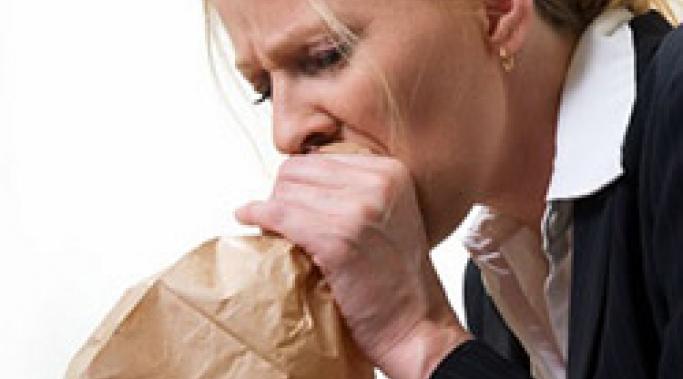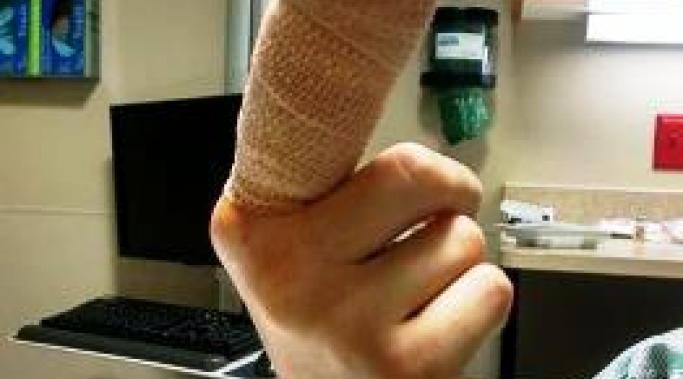If you've ever had a panic attack, you know what it’s like. You’re just going about your life, perhaps in class or a meeting or a store or somewhere else, even home, when bam! Out of the blue, your heart begins to pound and your head begins to swim. The world around you blurs. Your hands shake and sweat. You can’t breathe, and your chest constricts painfully. The ground wobbles, making it all the more difficult for your weak legs to keep you steady. You’re nauseated and oh god you don’t want to get sick. And as if symptoms like these (they can vary a bit from person to person) aren't horrible enough, on top of all this you begin to doubt and question yourself.
Anxiety Causes
Over the weekend, my wife was bitten by a dog. It was a serious bite, costing her the tip of her right index finger. I was present when it happened, watching in horror as she stepped in between two angry lab-mixes that were fighting over a bone.
We went from watching college football to panic in less than 30 seconds. As my wife sat down, holding her bloody hand, there wasn't time to think about much. My only concern was how to help her. My mother-in-law had separated the dogs, placing one in a cage, and raced over with napkins and began to apply pressure to my wife’s wound. At that moment, we had no idea how serious the injury was.
When I was younger, there was a public service announcement that ran over and over that explained that the majority of car accidents happen within a few miles from home. The purpose of this message was to encourage people to wear their seatbelts, even when travelling short distances.
I was a precocious youngster and when I saw these commercials I thought to myself, “No kidding! You travel close to your home most of the time, so it’s just common sense that most of the accidents would happen there.”
Anxiety and panic disorder follow a similar pattern. Since I am home more than I am away, the majority of my anxiety and panic issues occur at home. Additionally, I am more likely to have elevated anxiety before I fall asleep and I spend most nights in my own bed.
I must confess; I’m a bully. But not to others. I tend to bully myself relentlessly, criticizing what I do and don’t do, say and don’t say. It’s a nearly endless stream of self-denigration that runs always in the background, often in the foreground, of my thoughts. This harsh self-criticism is entangled with all types of anxiety.
By now, everyone has heard that beloved actor and comedian Robin Williams has died by suicide. His death, like all deaths, is a tragedy. The fact this was a suicide adds an extra wrinkle to this story. To most, it makes the event sadder or incomprehensible. For people who also suffer from depression or any other mental illness, discussion of his suicide is more personal (Dealing with Depression in the Wake of Robin Williams' Suicide).
When a famous, wealthy, and generally well-liked person succumbs to their illness, it’s natural to wonder how we can survive our own illness when someone with all that going for them could not. Nothing creates more anxiety than wondering whether or not we can beat our illness.
I am a people pleaser. It is nice to give people what they want and I enjoy taking part in their happiness.
Over the years, I have learned that I have to say “no.” As much as I love to please people, it isn't wise to give people everything they want. Sometimes it isn't in their best interest and sometimes it isn't in mine. As someone with an anxiety disorder, it often makes me anxious when I say “no.”
In a fit of anxiety, or in the throes of a panic attack, our minds sometimes chastise us for being so anxious. Our brains are consumed with worries, fears, and thoughts of going crazy, and our bodies overcome with agitation, sweating, trembling, aches, and pains. And yet our minds produce another thought that slaps us painfully across the face: “What is wrong with me and why am I like this?” To add insult to injury, sometimes when we turn to someone, perhaps a friend or a family member, in search of understanding and help, the message we receive is “What’s wrong with you? Why are you so anxious?”
As a speaker and blogger, I answer a lot of questions about recovering from mental illness. I am asked many different things, from the technical, to the personal, to the deeply personal. I sincerely enjoy the conversation, and leading group discussions is one of my favorite activities. Answering comments and emails is a close second.
It is because of my love of interaction that I decided to write an interactive blog. Every blog on HealthyPlace is technically interactive, in that they all have a comments section. This is a little different, however. The goal of those blog posts is to be read and the goal of this blog post is for you to participate. This won't be an interactive blog if you don't.
Have you ever found yourself in a situation where even though what had already happened was minor, you were aware that it could have lead to a more serious situation? The best example I can come up with is a three-year-old with matches. What is actually happening is a toddler standing there holding a pack of matches. What adults envision is the entire house engulfed in flames.
Anxiety and sleep problems can have a twisted, rather enmeshed relationship with each other. They each have a similar goal: to make us miserable. They are evil little accomplices on a mission to rule our world. It’s bad enough when just one of them is working its sinister plan within us, but when they join forces and attack us simultaneously, it’s downright miserable.









